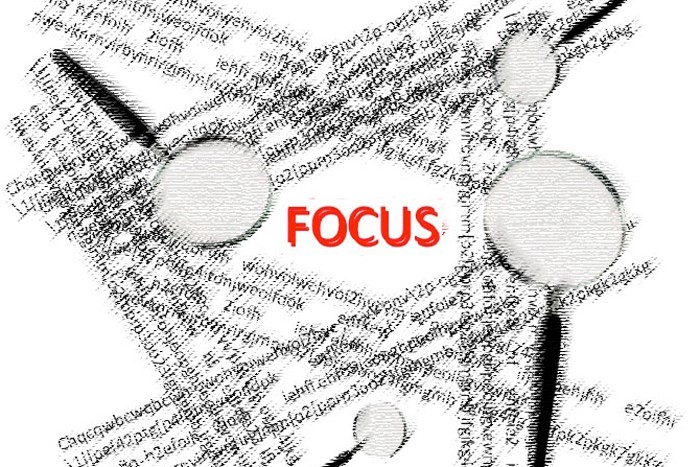In the moments before I took the call asking me to speak on BBC Radio about Focus, I had been:
- commenting on a family WhatsApp conversation,
- checking my phone messages,
- updating Facebook,
- reading e-mails,
- catching up on LinkedIn; and
- feeling guilty about not tweeting enough.
All fabulously entertaining distractions. Psychologists get very suspicious about this kind of behaviour, assuming that there is some displacement, i.e. the avoidance of a more challenging task, something bigger that we can’t face. So we mop up all the smaller tasks available, distracting ourselves from our true purpose. Habitual behaviours – like obsessionally checking all your social media or even your business e-mails – seem rational but repeatedly breaks concentration and shifts your attention from the important to the merely urgent. It is easy to blame open plan offices, gadgets or meetings for reduced focus, but the biggest single problem is likely to be yourself. Intrusive thoughts such as doubts about your ability or the enormity of the task destroy concentration and lead to avoidance. This problem gets amplified in the next generation: research on students by Larry Rosen has shown that they were only able to focus for a shocking average of 3 minutes and most of their distractions came from technology. Even when all the alerts were switched off- so no beeps or vibrations, they were still distracted, wondering about what messages had accrued. The best students were unsurprisingly those who could concentrate for longest and the worst were those who worked on several tasks at once and consumed more media. However, those who could exercise ‘Metacognitions’ – make insightful judgements about how to handle interruptions to their focus, did better. So self -awareness is the first step if you want to train new patterns of behaviour. Be honest about where the interruptions to your focus come from, remove them wherever you can and make informed decisions.
Focused leadership
We know from our own leadership model that a key attribute of successful leaders is Drive, and that Drive is a combination of energy (Zest) and the ability to focus despite high volumes of distraction, a desire for detail, competing demands and lack of certainty. They seem to exert a consistently high degree of self-control. Furthermore, successful leaders need what to focus on. Daniel Goleman – of Emotional Intelligence fame – claims that leaders need to use focus:
- on themselves: to be aware of their own feelings, values and intuitions;
- on people: to read them well, manage relationships; and
- on the big picture: to understand the larger forces and systems and to determine the best strategy going forward.
Some basic tips
We all vary in our ability to focus but individually experience a wide range of levels of concentration. What can we do to consistently operate at the top of that range?
- Don’t even think about multi tasking. If you want to know why, try walking behind someone who is walking and texting, especially if you are in a hurry – they end up not doing either thing very well. Science has shown that multi tasking doesn’t work. If you need to focus on more than one thing, do what is called switch tasking. Concentrate fully on the one thing for a period of time and then on the other. Some of us love to be spinning plates all the time, perhaps because we are terrified of getting bored. Multi-taskers just love the excitement. Successful people learn to focus when they have to.
- Learn to deal with distractions. The obvious external distractions are people interrupting – in person, phone, e-mail etc. Shut the door. Tell them you need 30 minutes and to come back later . Most things can wait that long. Often we allow things to break our focus because we really don’t want to do the task in hand. That’s probably because of the internal distractions – thoughts like, ‘it’s too difficult’ ‘too complicated’, ‘I’m not smart enough’ or even ‘what do I want for tea?’ These thoughts intrude if you let them. Keep drawing your attention back and politely telling yourself to shut up because it will probably be fine. I have already had two people walk in and start talking while I was trying to write this. Although I asked them (nicely) to leave me alone, it took minutes to get my focus back because of point 1 – I wanted to be in the middle of the plates. Now concentrate!
- Exercise your focus muscle – when you need to concentrate, check all your messages- phone, e-mails, Facebook and then switch everything off while you focus for 10 minutes. Each day, do a few minutes more without all the distraction. Gradually wean yourself off the constant stimulation. Make set times when you gorge yourself on all the social media stuff and then get back to focussing.
- If something’s worth doing, it is worth doing any way you can. It is easy to scare yourself out of focussing by setting the standard too high. Stop trying to do a perfect job. Settle down and have a go at ‘doing it badly’. Give that permission and you will get started.
- Focus on your dreams We often maintain we can’t focus on our important aspirations because we just don’t have the time. You never will, so don’t put it off. Just take 15 minutes at a time to have a go at doing something in bite-sized chunks. I’ve written 5 books now and I never had any time to do it so once I planned the content, it was 10 minutes when I got up, 20 minutes at the airport, 15 minutes before lunch and before I knew it I had thousands of words.
Ok, got that off my chest; now I can allow myself to tweet! Averil, François and all at White Water Group




